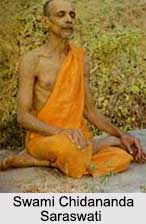 Swami Chidananda Saraswati is famously known in India as a jnani, yogi and spiritual leader. He also succeeded the President"s position in the Divine Life Society at Rishikesh in the year 1963, after his predecessor Swami Sivananda died. Swami Sivananda was the founder of the Divine Life Society.
Swami Chidananda Saraswati is famously known in India as a jnani, yogi and spiritual leader. He also succeeded the President"s position in the Divine Life Society at Rishikesh in the year 1963, after his predecessor Swami Sivananda died. Swami Sivananda was the founder of the Divine Life Society.
Early Life of Swami Chidananda Saraswati
Swami Chidananda was born to Srinivasa Rao and Sarojini on 24th September, 1916, as the second among the five children and the eldest son of the family. Swami Chidananda was known as Sridhar Rao before taking Sanyasa. When he was 8 years old, the life of Sridhar Rao was shaped by Sri Anantayya, his grandfather"s friend, who told him stories from the great epics of Mahabharata and Ramayana. Krishna Rao, his uncle, protected him from the evil influences of the mundane world, and planted in him the seeds of the Nivritti or life of renunciation, which he happily nurtured until it flowered into sainthood. The family of Swami Chidananda Saraswati was well-known for its high code of conduct which was imbibed by Sridhar from his early childhood. Service and charity were the main virtues of all the members of his family. These noble virtues found a perfect shape in the life of Sridhar Rao. He studied spiritual books which appealed him the most, even more than his college books. The works of Ramakrishna, Mahatma Gandhi, Swami Vivekananda and Swami Sivananda Saraswati, took priority over all others.
Social Works of Swami Chidananda Saraswati
He served the lepers without any hatred and used to construct huts on the large lawns of his home and used to take care of them as though they were deities. Later, when he joined the Ashram or hermitage, his early trait to help the lepers found in him free and complete expression.
Achievements of Swami Chidananda Saraswati
Swami Chidananda Saraswati received several awards for his role as spiritual leader as well as for his unparalleled humanitarian work. Few of his several awards include;
•The title of Patron of the Russian Indian Heritage Research Foundation, Moscow
•The title of a Patron of the Centre for Religious Experience in Oxford, United Kingdom
•The title of a Patron of the International Naturopathy Organization
•The title of a Patron of the Bapu Nature Cure Hospital in Delhi
Harmony, unity and the faith in infinite paths to reach God are the basics of the religion of Pujya Swamiji. His aim was to get all closer to God, irrespective of what name one uses. Swami Chidananda became a leader in several international, inter-faith conferences and parliaments, which also includes;
•The Parliament of World Religions in Chicago held in the year 1993
•The Parliament of World Religions held in Capetown, South Africa in the year 1999
•The Millennium World Peace Summit of Religious and Spiritual Leaders held at the United Nations in the year 2000
•The World Economic Forum in New York in the year 2002
•The World Council of Religious Leaders held at the United Nations in Bangkok in the year 2002
•The World Conference of Religions for Peace organized in Kyoto, Japan in the year 2006
•The Global Youth Peace Summit at the United Nations held in New York in the month of October 2006
He received the Mahatma Gandhi Humanitarian award from the Mayor of New Jersey, USA for his great interfaith and charitable work. He also received the Best Citizens of India Award. The Diwaliben Mohanlal Mehta Charitable Trust Award for Progress in Religion and National Integration Award are also held by Swamiji.
Works of Swami Chidananda Saraswati
Swami Chidananda Saraswati wrote may books including "An Instrument of thy Peace", "Bhaja Govindam", "Awake, Realise your Divinity", "Bliss is Within", "New Beginning, Message of Swami Chidananda to Mankind", "Light on the Yoga Way of Life", "Verses Addressed to the Mind", "Practical Guide to Yoga", "Ultimate Journey", "Guide to Noble Living", "Ponder These Truths", "Lectures on Raja Yoga", "Path Beyond Sorrow", "Philosophy, Psychology and Practice of Yoga", "Path to Blessedness", "The Role of Celibacy in Spiritual Life", "Liberation is Possible", "The Truth That Liberates", "20 Important Spiritual Instructions", "Guide Lines to Illumination" and a number of other books.
Swami Chidananda Saraswati became the head of the Parmarth Niketan, put away in the pleasant Himalayan hamlet of Rishikesh in the northern part of India. "Muniji", as Swami Chidananda Saraswati was affectionately called, discharged several social duties relentlessly. He passed away on 28th August 2008.




















